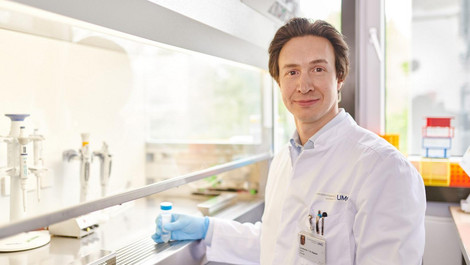Neurosciences
Research focuses at the UMG
The research focus neurosciences has substantially shaped the research profile of the UMG and Göttingen Campus for around 15 years. The research and educational activities of the research focus are intensely networked with university and non-university institutions on the Göttingen Campus.
Since 2007, the development of the research focus has been significantly characterized by the projects funded as part of the Excellence Initiative of the German federal and state governments, which the Göttingen Graduate School for Neurosciences, Biophysics and Molecular Biosciences (GGNB) and the Cluster of Excellence Nanoscale Microscopy and Molecular Physiology of the Brain (CNMPB) were part of. Since 2019, the Cluster of Excellence Multiscale Bioimaging (MBExC) has received funding by the German Research Foundation as part of the Excellence Strategy of the German federal and state governments.
The research focus neurosciences at the UMG and on the campus is especially characterized by its international visibility in research into synaptic and sensory signal processing as well as neuroinflammation.

The research focus Neurosciences in numbers
Collaborative Research Centers
Currently part of the research focus neurosciences are two collaborative research centers funded with spokespersons in Göttingen (CRC 889 and CRC 1286), and one transregional collaborative research center in cooperation with Munich (TR 274).
Network
Within the UMG, two interdisciplinary research institutes each with independent buildings and infrastructure – namely the European Neuroscience Institute (ENI) and the Center of Biostructural Imaging in Neurodegeneration (BIN) – have been established in cooperation with university and non-university partners. Another interdisciplinary research building for the planned Heart and Brain Center Göttingen (HBCG) is currently under construction
Even beyond the campus, the UMG is nationally networked into the topic of neurodegeneration, made possible by the Göttingen location of the German Center for Neurodegenerative Diseases (DZNE), which shares a hybrid building with the BIN. From 2021 onward, Göttingen will - alongside DZNE and DZHK - be the location of a third German Center for Health Research (DZG), and its Center for Child Brain Health Göttingen (GoBrain) will be funded by the German Society of Pediatrics and Adolescent Medicine (DZKJ).
The connection between the clinical practice and the basic scientific expertise at the location is ensured by neurological-psychiatric medical competence centers such as the Clinical Multiple Sclerosis Center, the Centers for Neurovascular and Neuromuscular Diseases, the Clinical Dementia Center and the Parkinson Center Göttingen-Kassel. In these, the respective pathologies are treated in an interdisciplinary manner according to international standards and the therapeutic options are continuously expanded in the context of clinical studies. Linking research bench and clinical treatment even more efficiently is a central task of the Heart and Brain Center (HBCG), which is currently being set up, as well as the branch office of the Fraunhofer Institute for Translational Medicine and Pharmacology (ITMP) in Göttingen, which was established in 2020. Here, new therapeutic approaches for chronically progressive neurological disorders are under development.
Awards & Funding
UMG scientists from the neurosciences have won prestigious awards and are funded by highly competitive funding programs such as the Gottfried Wilhelm Leibniz Prize of the DFG, Koselleck Projects of the DFG, ERC Grants of the EU, out of the Heisenbergand Emmy Noether Programs of the DFG as well as a Synergy Grant of the EU.
This might also interest you